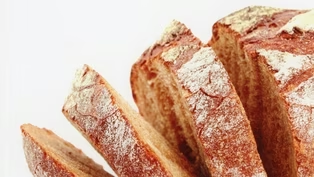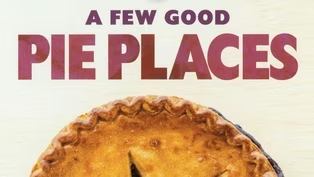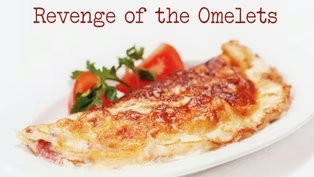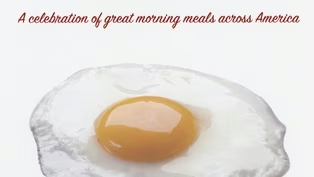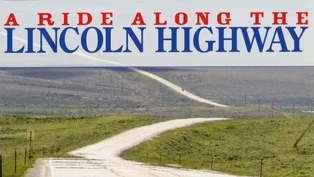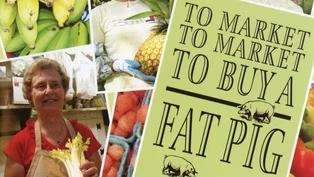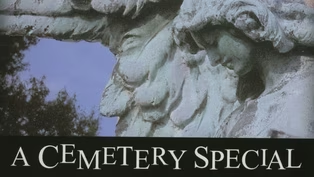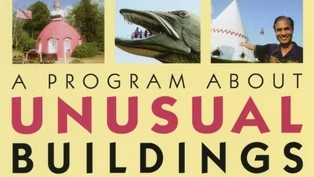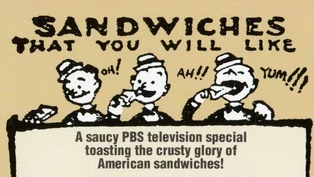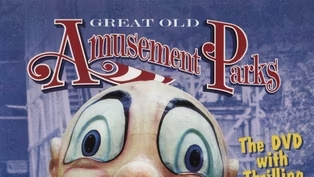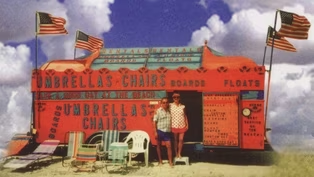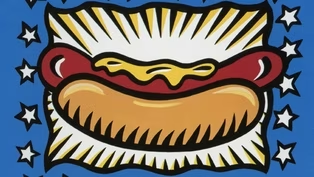
A Flea Market Documentary
7/30/2001 | 56m 30sVideo has Closed Captions
From 2001, a Rick Sebak film about the people and history behind Flea Markets.
This program from film-maker Rick Sebak (A HOT DOG PROGRAM) is an unabashed celebration of unusual people and enticing things to be found in parking lots, fairgrounds, drive-ins, on sidewalks, and wherever a sign says ""Flea Market."" Starring amazing old stuff, great salespeople, and the possibility of bargains, all uniting shoppers across the nation. Aired in 2001.
Problems playing video? | Closed Captioning Feedback
Problems playing video? | Closed Captioning Feedback
The Rick Sebak Collection is a local public television program presented by WQED

A Flea Market Documentary
7/30/2001 | 56m 30sVideo has Closed Captions
This program from film-maker Rick Sebak (A HOT DOG PROGRAM) is an unabashed celebration of unusual people and enticing things to be found in parking lots, fairgrounds, drive-ins, on sidewalks, and wherever a sign says ""Flea Market."" Starring amazing old stuff, great salespeople, and the possibility of bargains, all uniting shoppers across the nation. Aired in 2001.
Problems playing video? | Closed Captioning Feedback
How to Watch The Rick Sebak Collection
The Rick Sebak Collection is available to stream on pbs.org and the free PBS App, available on iPhone, Apple TV, Android TV, Android smartphones, Amazon Fire TV, Amazon Fire Tablet, Roku, Samsung Smart TV, and Vizio.
Providing Support for PBS.org
Learn Moreabout PBS online sponsorshipMore from This Collection
This collection features all of Rick Sebak's national programs, including 'The Hot Dog Program', 'The Ice Cream Show', 'A Flea Market Documentary', 'Shore Things', and many more!
Video has Closed Captions
From 2015, discover some of the best bakeries in America. (56m 16s)
Video has Closed Captions
From 2015, travel across America and visit shops, restaurants and more to find a few good pies. (56m 15s)
A Breakfast Special 2: Revenge of the Omelets
Video has Closed Captions
From 2010, this tasty sequel from Rick Sebak celebrates some great breakfast spots. (56m 39s)
Video has Closed Captions
From 2010, Rick Sebak visits interesting and unusual breakfast spots across the United States. (56m 39s)
Video has Closed Captions
From 2008, Rick Sebak travels across America's first transcontinental highway, Lincoln Highway. (56m 30s)
To Market To Market to Buy a Fat Pig
Video has Closed Captions
From 2007, this is a celebration of market places across the United States. (56m 46s)
Video has Closed Captions
From 2005, Rick Sebak looks at about cemeteries across the country. (56m 46s)
A Program About Unusual Buildings and Other Roadside Stuff
Video has Closed Captions
From 2004, Rick Sebak looks at the wacky architecture and structures within the USA. (56m 46s)
Video has Closed Captions
From 2002, a travelogue featuring delicious sandwiches from across the USA. (56m 46s)
Video has Closed Captions
From 1999, this documentary, you get to visit some of America's most charming amusement parks. (56m 46s)
Video has Closed Captions
From 1996, we profile American beaches, the things they are known for, and other notable facts. (56m 46s)
Video has Closed Captions
From 1996, explore the delicious world of America’s favorite street food, the hot dog! (56m 25s)
Providing Support for PBS.org
Learn Moreabout PBS online sponsorship(lively swing music) - [Shopper] One of the things I like the best about flea markets is the element of surprise.
You never know what you're gonna find.
There's always something neat out there.
- You never know what you got.
It's a big treasure hunt.
- I do it all day long.
I do it on the weekend.
I do it all the time.
I've never done anything I liked as much as I like this.
- Well, it's outdoors.
There's a lot of walking.
- We go to flea markets every day.
- You're socializing with people.
They all have to be very good for you.
- [Rick] People all over America have come to love flea markets, usually outdoor gatherings often on weekends with vendors, shoppers, and all sorts of stuff for sale.
- I'll probably end up buying as much as I sell, so.
- Just old stuff, that's what everybody like, old stuff.
- You can find something here you'd threw away at home 20 years ago if you look around a little bit.
- The ambiance, there's people like me, people like you that come here to see us.
(laughs) - A flea market is sort of an antidote to the malls.
- You never know what somebody's gonna look for.
- Oh honey, it's the bargains.
- There's always treasures, everywhere.
- You can work with us, where Kmart and all the rest of 'em not gonna do that.
- [Rick] (laughs) We're gonna check out a few markets around the country, from Seattle to Fort Lauderdale, from LA to DC.
- Even you don't make lot of money, but you know, you met a lot of people, you see.
- You meet a lot of really nice people, and some weird.
- Flea markets, it's like a show.
You never know what you're gonna see.
- [Rick] Well, right now you're gonna see "A Flea Market Documentary."
We're sorry if we didn't get to your favorite one, but there are just too many, they're everywhere.
- We just love a good flea market.
(laughs) (upbeat jazz music) - [Announcer] "A Flea Market Documentary" was made possible by the Corporation for Public Broadcasting and by contributions to your PBS station from viewers like you, thank you.
(calm music) - [Rick] Okay, let's start in Paris.
Open-air markets are an ancient tradition, but apparently Paris had the first big market with used merchandise.
The term flea market is a translation of the French marche aux puces, market with fleas, probably because some old things were full of bugs.
Most Americans knew the term flea market by the '20s, but markets in the US have really boomed since the late '60s.
In 1997, Sheila Zubrod, a writer in New York City, put together a guidebook titled "Flea."
She's thought a lot about flea markets and what makes them work.
- Objects have emotional significance for us, and that's one of the things that I think is fascinating about flea markets is you go in and you find what you respond to emotionally, and you learn a lot about yourself.
- [Rick] One market she knows well is the weekend one in Manhattan along Sixth Avenue from about 24th to 26th Streets.
- I like to walk around, you're outside.
It's sort of social.
I run into people I know.
I mean, it's a very friendly, welcoming environment.
- It's called the 26th Street Flea Market.
That's, most people refer to it as that.
- It works here because it's right in the center of Manhattan.
- It's really been the main flea market I think in the country for years and years and years.
And now, of course it is changing, because there's so much building.
And I find it hard to believe that this parking lot will be here very long, but as long as it is, it'll definitely be a destination.
- And everybody likes something else.
And your city is international city, you know.
- In the flea market, there are lot of old stuff.
(mother speaks Chinese) And they sold from all over the world.
They would come back and see if they really loved it.
(mother speaks Chinese) That's why they will come back and buy it.
- [Sheila] It's like you're taking a trip to about a hundred different countries, but all at once, and you're taking a trip like back through time.
I mean, you're going back to the '20s.
You're going back to the '60s.
- I don't know, I feel good surrounded by old things.
- A lot of the stylists and designers buy from us and then go out and mass-produce things, and you find them in the stores eventually.
But you find them here first.
- I'm not really looking for the bargain of the century.
It's just some stuff is a lot nicer than the way it's made today, the style.
- Yeah, I think you can find the best stuff in vintage clothing right here on 26th Street.
It's really sort of the cutting edge, you know?
There's vintage jewelry, which is wonderful.
There's glassware, there's silver, there's great furniture.
There's vintage clothing.
There's chandeliers.
There's anything that you would want within the vintage, you know, antique genre.
- [Rick] And what do you sell here at the market?
- Oh (speaks Chinese).
(mother speaking Chinese) We sell antique and Chinese stuff.
- [Rick] Anna Fang and and her mother, Yu, have a wide range of Asian items.
- So is a basket for like when you want to go somewhere, you can buy and put it inside there, because a long time ago, people don't have bags, use basket as a bag.
- [Rick] Anna has spent many weekends here in the market.
- I love it very much.
I really love Chinese stuff, and I really love to tell people how old it is, because when I was young, I usually come here and look around it.
- There's a lot of people that just like to collect things.
And you know, especially in New York, they like just filling up every last corner they have in their apartment.
- [Rick] And among the things Eric Schultz has brought to sell today is an old prosthetic leg.
- Three people ask me about the leg, and that's a hard seller, but you know, he'll find a right home, I'm sure, someday.
- Just there's something about the juxtaposition of objects that would never be together anywhere else.
It's just infinitely liberating to the mind, and it lets you see things out of context for the first time.
- There's so many people that have been bitten by the collecting and buying bug, it's amazing.
- [Rick] Alan Boss is the man who's been running the 26th Street Flea Market since 1976.
- What I found over my many years here is that it's part of the cultural fabric of New York.
It's a meeting place for traditional New Yorkers.
You know, it's like they meet, they socialize, they do business, and they go on with their lives.
- [Sheila] When you get something at a flea market, there's a story behind it.
You look at it, you remember the weather that day.
You remember the friends you were with.
There's a story.
(whimsical music) - [Rick] Well, mostly flea market stories happen on Sundays, and if you're in Seattle on a Sunday, figure out how to get to the neighborhood of Fremont.
- [Jon] Fremont's sort of like Seattle's Left Bank.
There's a spirit of fun and playfulness here that you don't find a lot of other neighborhoods.
- Fremont was always sort of known for its relaxed, kind of almost hippy throwback kind of area, which I think was a good beginning for the market.
- [Rick] The Fremont Sunday Market really began in 1990, thanks to one industrious couple, Candace Reiter and Jon Hegeman.
- We lived in London for 10 years, and my bride was a market vendor in Camden Lock and Portobello Road and places like that.
- So we started the market here.
I sold my work, and then I helped to run it, and now I'm on traffic.
(laughs) - It's a place where people can be free to be around many different people and feel at ease because it's very humbling to be out in a parking lot.
- Even though the place looks very small, you be surprised of the number of people who come through here.
Some people call them tourists, but they're from all over, like from all over the world, you be surprised.
- The flea market actually sort of established itself sometime after the farmer's market and the crafts market.
And it's now the tail that wags the dog.
I think we have a lot steadier patronage here in the flea market than for anything else.
- [Rick] That's probably because the vendors here have lots of cool junk like this 20th century stuff sold by Frank Olivo.
- I think my favorite thing here today is probably the 8-track player.
I love 8-track players.
- [Rick] There's Virginia Dundas, who sells vintage clothes among other things.
- Thank you.
- It's coat time of year.
- Oh yeah, for sure.
- Thanks.
- Thank you.
- Bye.
- [Rick] Boma Cho from Cameroon who plays guitar while selling art and T-shirts, and Evelyn Dye-Garcia, who's got a good mix of funky stuff.
- I always bring something I call my titillator that everybody will look at.
I think the leopard chair's my titillator today.
I sold three of them last week, so I brought one more this week.
- My part of the business anyways, is I pretty much sell recycled memories.
- So I used to have an antique shop, and my daughter worked in my shop.
And so she's down here doing what mama showed her how to do from an early age.
Say hi, baby.
(laughs) - My favorite place to go with my dad was the dump.
I know, is that terrible?
It was my favorite place as a little girl.
I liked to go to the dump.
And so I don't know, maybe now I must have been doing this in a former life, too, because I was always interested, and I had garage sales when I was in high school.
- When I was 16, I had a friend in high school who had a house full of stuff and a Harley parked in his living room, and he didn't have a job.
He wasn't selling drugs.
And I asked him what he did to support himself, and he said, "Well, if you wanna know, be at my house at six o'clock Saturday morning."
So I was at his house.
We went to a flea market, and I got hooked.
- The flea market people are the most creative people I know.
They're my friends.
They're all people who are like me, who understand.
You know, I get up at 4:30 in the morning and drive two hours to come here every week.
- If you think of the African village market, right?
The people might look a bit different, but the context and the flavor's very much the same.
- Actually, a little later here, I'll be going down and getting flowers, 'cause that's sort of a must.
And there's a man who makes crepes, fresh crepes every Sunday, and they're wonderful.
- [Rick] His name is Andrew Eigenraul.
He and Ruth Bostwick make delicious thin French pancakes and a good part of their living in this market.
- It's a real good deal.
You know, where else can you pay a rent of 15 or $30 a day?
- [Ruth] Perfect flea market.
- [Andrew] So there's no comparison.
- It's entertaining, it's like a circus or a carnival with junk.
No rides, this guy looks like a ride over here.
- No, come check it out.
Please, that's what I'm here for.
I'm making completely comfortable, washable, practical Utilikilts.
- [Rick] Kilts, pleated skirts for men.
Steven Villegas is a young entrepreneur who started his Utilikilts empire here.
- What size are you?
I was so flooded the first day I came to the market.
I sold one here, and ever since then, I've been coming back, but I couldn't have done it without this place.
Back in '95, I invented, invented, I chopped up a pair of commando pants, this is the original one.
If you've ever worn a kilt, the one thing I'll swear up and down about is the freedom, the breathability.
Basically it's like wearing a belt.
I've got contractors, truck drivers, people at Microsoft, and the girls love them.
Women love Utilikilts.
Women that come through this market, they're just like, "Oh my God, that's a fantastic, these are so sexy on guys."
And that's great, I need 'em so bad.
My clients swear up and down by these things, and they're in love with them.
- I think what makes this magic is the characters and the attitudes and the stuff that they bring.
And you have people who have a lot more sort of sense of theater and presence and so forth.
And you get, you just get all kinds.
- [Rick] A market's ability to attract all kinds is important.
You want a good mix of people and merchandise, like in Pasadena.
- Every weekend in Southern California, there's another flea market, and the second weekend is the Rose Bowl, you can't miss it.
- I know people from Arizona, from Indiana, Kansas that come to sell here.
They bring their stuff from all over the country.
- There's a lot of wonderful things here, and there's also some junk.
(laughs) - Hey, you know, there's places to go for antiques, and then there's the antique swap meet at the Rose Bowl.
- [Rick] It's at the Rose Bowl, but it's not inside the stadium.
Since 1968, RG Canning Attractions have organized and run this sale that goes on all around.
Tammy Bailey is the event manager.
She makes sure the 3,000 vendors get into the right places.
- Our main entrance being here.
This is around the perimeter of the bowl, and this is brand-new merchandise.
This lot here is antiques.
And then you go over a couple of bridges here, and here are more antiques.
It's understood that this is the world's largest flea market.
- [Rick] Several markets claim to be the biggest, but size isn't that important.
What matters is the stuff that the vendors bring.
How does Anna Holladay decide?
- You go out and you open your storage units up, and you pick, well, what do you think people are going to buy today?
And this they wouldn't see every day.
This is an old Maytag washer.
One lady said this morning she wanted to buy it and put it in her backyard for flowers.
I says, "No, it still works!"
(laughs) And for $150, it's yours.
- Usually you get the serious collectors first thing in the morning, and then later on, like this time of day, which is like 10 o'clock, you get more people who are just shopping or looking for a bargain or some kinda impulse purchase that, "Oh, look at that, it's cute," you know?
And then they wanna take it home.
Dharam Damama Singh and his wife, Dharam Damama Kaur specialize in art and frequent flea markets on both coasts.
- I think our booth sort of reflects like a happy mood.
You know, just the objects are beautiful, and you get enjoyment from that, and that's how, actually, our main focus of buying stuff is like things like that.
- [Rick] Some of these vendors are landmarks.
- This is our 30th year right here on this spot.
- [Rick] Jimmy Dudley sells old furniture.
- We buy it, fix it, clean it up, restore it.
I think this wardrobe is probably one of the nicest things.
I have people come by and says, "Oh, I bought that table from you like 30 years ago."
And you try to say, "Oh, yeah, okay, sure, I remember you."
(laughs) It's hard to remember people after 25 years, but at least they knew they got it from me, and they're still happy with it.
- [Rick] Some people are happy about the new furniture in this market, too, like the rustic chairs and swings made by hand from willow by Santiago Hernandez.
- It's easy to make it but hard to find the wood.
We cut it, and we bend it when it's still green, and we just let 'em dry right there.
One chair takes about a day.
So we've got a lotta customers here and wonderful people.
- You've been walking around here, there's something for everybody if you're a collector.
- This is a watercolor drawing of a clipper ship, and you know, I'm ever hopeful.
This one seems to be signed Marin.
John Marin is important American artist.
- Yeah, it's an antique one, and I'm sure from over there, it doesn't have to be too old over there because everything over there is older than it is here, of course.
- This was for a decorative price, and if it turns out to be an early John Marin, then I've had a very good day.
(laughs) - Our whole house is full of stuff.
Even my wedding ring, I got here at the Rose Bowl swap meet from this guy who sells estate jewelry over there.
- I bought this for my wife, it's the year of the pig.
And then the year of the rat, one of my children.
- Well, my stepmom's a set decorator for shows, and so I usually come along with her and get stuff like Beanie Babies, just stuff.
(laughs) - It's different, every single booth you look at down the line has something different.
And you know, this one may have Hawaiian shirts, but this one will have a whole different crop of Hawaiian shirts.
- [Sean] It's hard to find them in a good size 'cause American guys are usually extra large, 2X and that kinda thing.
So that's why the new ones sell so well, the new reproductions.
- [Rick] Sean Hammond sells primarily vintage shirts.
- More and more, it just seems like people just come to really kinda look at the museum of Americana of the 20th century.
- [Rick] Some markets are like open-air museums, and some vendors like David Hall are like curators.
- These are glass insulators from the old telegraph and telephone era, and they used to hold the wire or the old telephone.
Kinda up there, that's what they used to look like up on the arm.
I have about 2,000 in my collection.
I like getting people started, and that's the reason I bring them out here, to let people know that there is a world of insulator collecting that exists.
- It's kind of like we're recycling things, but at the same time, we're trying to sell them, too.
(laughs) So in that case, it's not really a museum.
You know, it's a museum for sale, where everything's for sale.
- We sell antique wind-up phonographs that were made from the late 1890s to the late 1920s.
- [Rick] Scott and Denise Corbett know all about these things that they've brought.
- I teach school, so I usually go into the whole history of the phonograph, whether they wanna hear it or not.
(Denise laughing) And what's fun is that you're hearing it just the way the original owner heard it.
(lively ragtime music) Basically at the time, there's no radio, there's no TV.
So if you wanted to detain the kids for a while, you'd put on this dancing toy, and the kids would just watch it.
- I think old things have character, and they have history.
When you go to the mall, it's all, you know, the trendy, everybody has, it's all the same-same, boring!
- It's seeing the things that your dad had or you had when you were a kid, you know, happy memories.
That's pretty much what the flea markets are about.
- [Rick] Well, in Texas, the happy memories are big and old.
Most experts will tell you the oldest flea market-type sale in America is in the small town of Canton, Texas, where Don Hackney is mayor.
He's got a pilot's license, so we can show you how huge their monthly sale has become.
(lively music) - We have anywhere from two to 300,000 people that show up.
It started in the 1850s, and the district court was held on the first Monday of each month, and the farmers came in to trade.
- [Rick] Well, the trading has become a tradition, and there's no property tax here because the town makes so much on what they now call First Monday Trade Days.
Al Campbell is manager of the event.
- It's the oldest, it's the largest.
You know, we draw vendors and shoppers from all over the United States and overseas.
- And it's fun to walk it.
You know, how many places can you spend the whole day, and if you don't wanna spend any money, it don't cost you any money?
- [Rick] But vendors like Karen Johnson bring all sorts of unusual things to try and get you to spend money.
And there are no price tags on any of her primitives.
- You weren't misbehaving.
You gotta talk to me to get a price.
You gotta have, you gotta be a people person.
And that's the name of the game.
- [Rick] The game here also includes Texas chainsaws, because several guys like Mickey Holt are sculpting logs.
- I'm also carrying on the tradition from my father.
He started this, and I'm just wanting to keep it going.
- [Rick] People buy his folk art American icons made of local wood, especially cedar.
- I don't really know when they leave here what they're doing with a lot of it.
(laughs) But long as they leave here with it, I'm happy.
- [Rick] There are happy vendors who trade all kinds of goods.
The Carlin brothers have been coming here for more than 20 years.
- Right, we don't have- - Well, we're twins, we're twins.
We've known each other for about 63 years.
John is a retired math teacher from Texas, and I've retired college professor from Oklahoma.
And so we meet here in the middle at Canton and sell commemorative soda water bottles.
We're up to about 35,000 bottles, and they go in value from about $2 apiece up to 400, 500, $600.
- Started in '71 when the Dallas Cowboys won the Super Bowl, Pepsi-Cola did a bottle.
- We buy 'em in the grocery store.
We go all over the country.
A friend of mine said, "Well, aren't y'all trying to make money?"
And I said, "My God, if we were trying to make money, we woulda had to quit years ago."
We don't make any money.
We have fun.
(laughs) - [Rick] Well, here in Texas, some of the fun is running into cowboy types like John Homer, whom lots of folks know as John The Saddle Man.
- I figured most people remember your first name and something about what you do, so John The Saddle Man works.
- [Rick] He sets up an outdoor saddle showroom and knows that he may not sell them right away.
- You know, on a item that's kind of a high-dollar affair, people don't just walk up and say, "I believe I will."
They're like me and you, they kinda like to chew on it a little bit.
And then once they get their mind made up, they call me on telephone, "Come over to house."
- [Rick] One of his handmade saddles is a high-dollar affair.
- Well, they'll start out $1,550, fully rigged, lifetime guarantee, and then work their way up.
- [Rick] If somebody's a good talker, good haggler, can they get you to come down on the price or?
- No.
(laughs) - [Shopper] We've been trying for years, and we're still trying.
- Everybody I deal with is a good talker.
(laughs) - [Rick] And lots of folks at this market are good eaters, too.
Randy Burton sells hot corn on the cob from a big roaster.
- Well, I seen some guys doing it and I decided, "Well, I might as well as try it," I went and made me one.
- [Rick] He stays busy.
- So far, it does pretty good.
You ever get somebody to try it, you know, they just keep coming back.
- [Rick] Randy pulls the husk back, wraps the cob in a paper towel, and everybody wants it dipped in his melted butter or whatever it is.
- Everybody's a little bit different.
- [Rick] He also has a big selection of seasonings to shake on the corn.
- It's kinda like I just try to buy a little bit of everything and put out there, and every time I figure out what everybody's gonna buy is what I'll get.
- The lemon pepper is delicious.
- That and that Parmesan cheese, I go through a lotta that.
- And the one thing I have found around here is turkey legs.
I'd never heard of people eating turkey legs until I come to Canton.
- [Phil] We can wrap it to go, you eat it slow.
You can get 'em to go, four, oh, oh, turkey legs!
- [Rick] Phil Hickle has been selling these things for more than a decade.
- People come up and ask us all the time, "How come yours tastes so much better than ours?"
Well that's 'cause we smoke 'em, you know?
A lotta people, they just look for the bulkiness, the amount of juice that runs out it when they pick it up, you know?
- Well, they're good.
They drive over a hundred miles just to eat of of 'em.
You can have that, thank you for the- - The best turkey leg in Canton.
- [Phil] That's right now, best in the west.
- All I know is they're good.
(laughs) - [Rick] Food may be crucial at some markets, but at others, what's important seems to be when you arrive.
About 30 miles south of Pittsburgh, Pennsylvania, in Washington County, people line up at the local race track known as the Meadows for the sale on the last Sunday of every month.
- [Maureen] The first ones in line have been there since Friday night, and then we start letting them in about six o'clock Sunday morning.
- [Rick] Maureen Kirwan and her crew collect fees from the lined-up vendors in their vehicles.
- Morning, that's 50.
- Good morning.
- Is it gonna rain?
- Thank you, I don't think so.
- [Rick] Here at the Meadows, as the dealers set up in the parking lot and in the grandstand building, there are already early shoppers who pay the dealer fee to start looking at 6:00 am.
- It costs $50 plus a couple dollars extra per head to come in early.
But if you snooze, you lose.
If you wait too long, you're gonna miss out all the really cool stuff.
- Well, I've got ox yokes, spinning wheels, and the railroad memorabilia.
- I go for small items.
- Early, early 1900s, mid 1900s, some 1800s.
- I guess just collectors.
They collect stuff, so they're looking for what they want.
People will buy anything.
- [Rick] By the time it gets light, the four to 500 vendors are in place and probably haven't sold everything yet.
Over at one side, shoppers who pay $3 are lined up, some in cars, some on foot waiting till they can get in at eight o'clock.
- I go to the back first, the rear, because they let them in in order of who's first.
- I look for china.
- Oh, I look for old military stuff.
- Breyer model horses.
- How much do you think we can get for him?
- They're like Barbie horses, but better.
I've been collecting them since 1978, and I have over 800.
But there's a few that I don't have, so that's why I come out.
(laughs) - They're pretty headstrong about wanting to get in as fast as they can and see the stuff that a lot of 'em will run up and down the aisles to see the good things before somebody else does.
- In the morning, it is unbelievable how the people will line up and buy and buy and buy.
And this collecting thing is big today.
What caused that, I don't know.
- I think it's, for me, it's just something to do extra to make a little extra money.
You know, you need that little extras.
(laughs) - This is a Wolverine toy from over in the Pittsburgh area there.
Hold the lever here.
(whimsical mechanical music) That's from 1930.
- Little Red Riding Hood, no chips or cracks.
They made probably five, six different designs.
The red shoes right now are going for about 1,200.
Mine's 450 and have red shoes.
(laughs) - This is called the Tap Dancer, and that in a box.
You wind him up, and he does a tap dance, and he swings his arms around.
When you get the toys, well, if you can get the box, well, then, you're better off, because you know, sometimes it really can add a lot to the value of the toy.
(crank clicking) (toy clicking) Little Tap Dancer, he's called.
He's about 4 1/2, 4 1/4.
- Well, there's a lot of old families in Pittsburgh, people who didn't throw things away for years and years and years.
And probably Pittsburgh is the place where a lot of people come to buy because it's cheaper in Pittsburgh.
- This is the Merry Maker Band.
Give 'em a little wind here and see what happens here, stop.
'Cause this was 1929.
This was the Mickey Mouse, supposed to be the Mickey Mouse, but they didn't wanna pay for the license of it, so they called, Marx ended up calling it the Merry Maker Band rather than Mickey Mouse Band.
(toy rattling) (vendor laughing) And that in the box is 2,000.
This one here, I could probably go about, around eight on that.
- Oh, it'll come down, I give 'em a little bit discount.
A lotta times, they want a lotta discount, I can't do that.
(laughs) - [Rick] Here at the Meadows, they're careful to not call this officially a flea market.
Since 1978, when Mary Jewel Kirwan got her husband and kids to help start all this, they've called it an antique fair or a show.
- It just gives a little more pizzazz, class than garage sale, flea market.
- Flea market does tend to mean tube socks and the items that you're gonna find on somebody's garage sale, and really, that's not what you're gonna find here.
You're gonna find antiques and collectibles.
- [Rick] So now daughter Bridget and son Michael run the show, sale, or whatever you call it.
- It's always been a sale.
It's not really just to show your stuff.
It's to sell your stuff.
That's what they're here for.
(laughs) - A flea market, yeah, it definitely is a flea market.
It's very organized, though.
It's very clean.
People are very friendly.
- In the 21 years that we've been coming here, never has been a bad day.
- [Rick] So is it all worth it?
- Financially, no, physically, no, and mentally, no.
(laughs) - [Rick] But you do it anyway.
- But I like it.
- I didn't do too bad, really, today.
It's been moving, moving along.
Less packing than when I come.
That's the idea of it all, you know?
- [Vendor] All we know is that it works, and people are happy, and they keep coming back, and we consider ourselves to be very lucky.
- [Rick] Luck may play a factor, but adapting to the changing needs of shoppers is important, too.
In March 1960, George Bumb founded the Flea Market in San Jose, California.
It's changed and grown from 35 acres to a busy 120 today.
- Wanna bite.
- [Rick] George's son, Brian Bumb, runs it now, and when he walks through the market, he likes to taste things.
- Not too hot, it's okay.
(laughs) - [Rick] The San Jose Flea Market is open Wednesday through Sunday.
- [Charles] Four yards, $8.
- [Rick] And even midweek, a fabric vendor like Charles Tolbert always sets up at 7:00 am.
- How many you have?
One can sell me.
- Well, there's a lot of people from different countries that live in San Jose.
You know, they still hand-sew, and they make all their clothes, they don't buy 'em.
So that's what makes the market pretty hot out here.
They get a little bit more fabric, about a inch and a half to two inches on each yard when I do it by hand.
I mean, you're not gonna go broke coming out and buying fabric.
- [Rick] You can shop for electronics, clothing, or used items here, but you can also get fresh fruit and other foods in the aisle known as Produce Row.
Aurora Fausto and her family have one of the corner spots.
- Thank you.
The customer likes because we have the best produce.
The people come, and we try to give her the bag, and "May I help you, okay," and give you the bag in the hands, you know?
That's more like close to the customers, you know?
This is Mexican pumpkin seed, and this is garlic pistachios, Japanese peanuts with sesame seed, cashews.
Oh, my goodness, I have a lotta stuff.
- [Rick] (laughs) Well, if you want exotic vegetables to stir fry.
- That Italian eggplant, bitter melon, and lemongrass.
- [Rick] You might run into Narit Run, originally from Cambodia, who's here most Wednesdays.
- I'm the farmer, like we cut yesterday, and then we sell today, all Asian vegetable, and this one, bitter melon there.
[Rick] And again, for stir fry or seasoning?
- I haven't, I have no idea about this one, but mostly Filipino, they like it.
- Are these called habaneros?
(laughs) Okay.
Whoa!
Oh, man, that's hot.
Just a little bit.
Whoa, wanna a bite?
Oh, man!
(laughs) Oy!
- [Rick] (laughs) Sometimes it's best to ask before tasting.
Hector Garcia knows what's hot and what's not at his parents' stand.
- We sell a lotta Mexican products imported from Mexico.
We got candies from Mexico.
We sell pinatas.
Most everything's, vegetables from Mexico.
Everything's imported.
- [Rick] Including these cactus leaves that in Spanish, they call nopales.
They call 'em steaks, Mexican steaks.
(laughs) It's real easy to clean 'em, just go like this.
It's real simple.
If you wanna do the egg omelet, they say you just do little slices like this.
You start frying 'em, you chop up some onions, you know, some tomatoes.
Just throw the eggs in there, and makes your omelet.
And it's good, man, it's good stuff.
- My wife makes it once in awhile.
You mix it with eggs, and it's great, it's nopales.
I actually met my wife here at the flea market.
(laughs) - [Rick] Aw, you can find just about anything here, including the item of clothing that scares some flea market fans.
- We've got a lot of sock, good sock.
- [Rick] So how much?
- Dos por cinco.
Quatro por diez.
- [Rick] All you need to know is the international language of buying and selling.
- I don't know, we understand each other, it's cool.
- Different kinds of people come, and we speak a little language, different language.
You know, we learn.
- When you talk about the immigrants that come here, the flea market stays within their comfort zone because it's just, it's very similar to the markets that they have in their countries.
It's open air, and it gives 'em the feeling of home.
My mouth is still burning from that thing, whoa!
(lively music) - [Rick] (laughs) Well, out West, flea markets are sometimes called swap meets, and down the coast here in Costa Mesa, California, every Saturday and Sunday, there's a market that began as a swap meet, but it's evolved into something else.
- [Announcer] Good day, shoppers, and welcome to the Orange County Market Place.
- [Shopper] There's not much garage sale merchandise out here.
- It really isn't what most people think of as a flea market.
- I've always enjoyed coming to the Market Place because it's outdoors, you're outside.
It's much nicer than inside a mall.
- You can buy a Bud Light.
You can walk around and have a beer, and you can take off your top and put on your shorts.
- When you come into this parking lot, and you see that these people got up early in the morning to set up and put their goods out in front of you under a tent, you really feel, as a shopper, you feel very good.
Total lack of intimidation.
- Free samples today, beef jerky.
- [Rick] And that's the way Bob wants it.
Bob Teller founded this market that's become an unusual mix of new merchandise and upscale services.
- Hard to believe that you can come to a swap meet, get your hair cut, get a pedicure, and get a manicure.
We have areas that have produce.
We have areas, arts and crafts.
We have some closeout merchandise.
We also have frozen chocolate-covered bananas, you know, which is where I started in my whole business career with frozen bananas.
Yummy, yummy, yummy, yummy, yummy, I love 'em.
- [Rick] Well, in 1968, Bob the Banana Guy decided to try to start a swap meet.
- Well, we started off as a company that we called Treasures and Trash, clean out your closet, clean out your garage, and turn your trash into treasure at the Orange County Fairgrounds.
By doing that, we created a crowd of people over a period of time, and as it grew, people with stores said, "You know, there are more people at that fairgrounds on the weekend than I see in my store."
So they came out and had outlets out here.
- The advantage of being here at the swap meet is there aren't very many places in Orange County where you have 20,000 people on a busy weekend that passes in front of your storefront.
- People come walking by, and they just, they stop.
They they're like, "What, did you see that price?"
You know, and it's just, it's a lot of fun.
There's a lotta things going on, and there's just some incredible deals.
- We have the best price!
We are sunglasses!
The people walking by, it gets their attention.
The more attention I can attract, the more sunglasses I sell, and that's.
(laughs) - Actually, here at the swap meet, we don't sell.
We show, usually upper-end vehicles like Mercedes, Lexus, BMWs, and Jaguar.
We get the people's attention, and they come in.
I mean, the cars usually sell themselves.
- See, it's coordinated beautifully with her.
- [Rick] That's Karl Rappl.
He sells purses here.
Beverly Hills Bag Lady has been here 20 years at the Orange County Market Place.
Because we deal with so many manufacturers, we get a lot of one-of-a-kind bags that they never go into production with.
They're wonderful bags.
These are bags that came from Florence, Italy, that we just came back from.
These are gorgeous hand-stained leathers.
They're very expensive.
We get a bang out of it, and not everything's a great buy out here.
I don't mean to say that, but if people shop around and see a value and they buy it, then they're really proud of it.
- Probably the best deal is the asparagus.
Nice little tiny asparagus, 1.99 for a bunch.
- [Rick] Searching for the best deal is part of all this.
But if you check out a place like the Swap Shop in Fort Lauderdale, Florida, you'll find that lots of things contribute to the success of a market.
- This one is good in the sense that it's big.
- I think this one is a staple of South Florida.
- You meet a lotta people from all over the world in this flea market.
You get a lotta tourists in here.
- [Rick] The Swap Shop is a huge flea market that becomes the world's largest 13-screen outdoor theater at night, but it was just a humble little one-screen drive-in when Preston Henn bought it back in 1963.
- The first night that I had the drive-in theater was the night that JFK was assassinated, and it was maybe two or three years before we started the flea market.
- [Rick] Since 1988, the Swap Shop has been open every day, even on Christmas.
- And we get more new customers here on Christmas day, people that have never been here and would never come here because ain't another thing to do in the whole Greater Miami area.
- [Rick] Well, here you have sort of permanent inside vendors and ever-changing outside ones like Heather Irving.
- I have too much stuff.
I love it.
I keep buying it.
And this is the way I have to share it with people and make a little money.
And here you have the added attraction of you never know what you'll find.
You could get anything here.
I mean, look across the way.
The people have a full-size bar and the stools and everything.
- [Rick] It actually sold very early in the morning, and it was brought out here by a guy named Rocky Bieger.
- Actually, I'm in the trash business, and I own a moving company, too.
A lotta people give me unwanted stuff that they don't wanna move from place to place.
So they say, "Go ahead, and you take it," and I turn it over for whatever I can get for it.
And if it's $5 or 10, it's just found money, 100% profit.
The faucets alone are worth 100.
- Yeah, will you take 10 apiece?
- No.
- No?
- [Rick] Rocky does okay.
- Good to see ya.
- 9:30, I've only been here four hours, and I'm already 1,000 ahead, it's not a bad day.
I'm taking my wife on vacation for two weeks tomorrow, and it's all pocket change for us, right?
- [Rick] Everyone who sets out stuff hopes to make a few bucks.
- Well, we came out to sell some items to raise money for our family reunion that we're having in June.
We've raised over $200.
- Right now, everything's, what, 50 cents for the most part per item for clothing and what, a dollar for shoes.
Any little bit that we get is better than nothing.
- [Rick] Nobody really enjoys the unpacking and repacking of stuff, but Bobby Arnold has an especially heavy job.
- I bring a truckload of weights and weight equipment every time I come out here.
The presentation or putting the stuff in the truck is at least a four-hour job, 'cause I try to bring a little something for everybody, you know, from jump ropes to heavy-duty Olympic sets, you know?
Give you good deal on 'em.
Got the little rubber ones, too.
- They're actually kinda cute for practice.
- Hey, now, watch out now, whoo!
(nunchucks rattling) All right, man, not bad.
- [Rick] It's a sale and a show with a circus, too, not a flea circus, a real circus with spectacular animals led through the market every day by George Hanneford.
- More times, and often I walk by, and people are so busy shopping for bargains, they don't even notice us walking by.
Watch out, folks, clear the way, please!
Make way for the elephants, please!
No matter what you want, they've got it here.
And the show is just like the cherry on top of the sundae.
- The Hanneford Family Circus!
(dramatic music) - [Rick] The Hanneford family is one of the world's great circus families, tracing their history back to the 18th century.
They put on a small but impressive circus here every day, three times a day on weekends.
- [George] This is unique.
We came here back in 1989.
We were supposed to be here for 10 days, and it's turned into about 12 years now.
- It's what sets us apart.
We're an entertainment shopping complex.
- [Rick] But sometimes the entertainment is the shopping.
- Senorito, senorita (speaks Spanish).
- [Rick] Especially when you're drawn in by a perfume salesman Like Michel Lancris, a Frenchman who makes this into theater, or as he says, theater.
- It's my, it's theater.
Me, all my life, I want sing, I want theater.
I don't have chance.
I have chance here, yeah, yeah?
The people like me.
I like the people.
I speak French, Spanish, Italian, Arabic, Hebrew, you know?
I have communication with the people.
Sometime I sing for the beautiful girl.
♪ Oh look, hey baby ♪ ♪ On the rock and roll, yeah ♪ Hey, you, I like this.
This is my life.
I like my job.
I like this structure, I like.
- [Rick] People also like the African art and show put on by Mohammad Duchamp from Senegal.
- Some people just come to get entertainment from me because I'm a drummer, I'm a story teller, I'm a dancer, you know?
And I tell them some story they like about my country, about Africa.
Some people come to collect stuff.
Some people come to learn things.
Some people come to meet.
Some people come to experience certain kind of things like a food.
Like, you know, it's a variety.
The diversity is fantastic, you know?
Everybody should come in this flea market.
- [Rick] Everybody can come to a flea market that's always open, but some sales are special events.
Every August, on one long weekend, people come to shop along 450 miles of Highway 127 from Kentucky to Alabama.
- Well, I've always been a yard-sale junkie, and the idea of being able to go down the highway and see one after another after another for hundreds of miles, that's just irresistible, you know.
- [Rick] They call it the 127 Corridor Sale.
It's Thursday through Sunday, but some folks start early.
- Started setting up on Monday, and we was already rolling, on Tuesday afternoon, we started rolling.
Today, it hit just like dynamite.
They've been here just lined up, up and down the side of the road time.
They come just like that, and they leave just like that, and here they come again.
- That there's a nice little piece.
- Yeah, that's a 1940 double barrel- - You better put that down.
- Pop gun, works.
- You can get arrested for pointing it at somebody.
- Hey, it works!
- It works, right there.
- [Rick] John Banner and Ed Hanson are two jokers from North Carolina who set up here in Kentucky.
- If you ever saw something you never wanted or never even thought about buying, we got it.
- [Ed] We did $150 for it.
We'll take a little less.
That's a rare piece.
- It's signed by Gene Autry.
I signed it, but it's his name.
(group laughing) But he don't know it.
I'm not telling anybody.
- We'll take $60 for it.
You want that wagon.
(cane knocking) - I'm not telling anybody, stay right here a little while, I might get it cheaper, mightn't I?
- I tell you what, we draw pretty women like flies.
- You draw pretty women- - I can't take but $45 for it- - Like flies?
- Because it's worth it.
- For $45.
- For the life of me, I don't why ever pretty woman stops here.
- [Rick] (laughs) Where to stop becomes the big question.
- Last year, we sold $1,100 yard sale stuff.
- Yes, we did.
- In three days.
- [Janie] The name says yard sale, but really it's like a giant flea market.
- [Rick] When they're not out here selling stuff, Joe and Janie Hamilton often perform as Abe Lincoln and his wife, Mary Todd.
- Is this cool or what?
I'm the only second-generation Abe Lincoln portrayer in the ALP, which is Association of Lincoln Presenters.
- [Janie] Mary Todd would think that she was above this.
You didn't do this kind of stuff if you were from a well-to-do family.
- [Rick] Now, everybody does it.
You've got tiny individual yard sales and common spaces like this field where Jessica Padgett has piles of stuff.
- I don't know, clothes and candles.
I got married last month, and some of it's wedding shower gifts.
(laughs) My husband's really proud of that Inspector Gadget thing the doll that they had at McDonald's.
- Something wrong with him?
- So I've been told to watch it and make sure it don't get gone unless I can sell it for good.
- Well, we've been shopping and looking at stuff.
And at first, there was not very many toys, but after that, then there was so many toys at every places.
- [Rick] (laughs) You browse and you drive.
You stop in this motel courtyard where Reg Moulton sells old stuff, and Betty Westfall has a mix of things.
It's a convenient spot.
- Yeah, I'm in Room 7, it's real nice.
- Yesterday morning at 10 o'clock, I left the parkway up there.
I bought all the way.
- Well, I came here on Wednesday, and I was thinking, "Oh no, this isn't gonna be very good."
It's good.
(laughs) - I spent over $500 between the parkway and here.
(laughs) - Now, here's something right here I sell a lot of, is your leather gloves.
- I found that money changer yesterday, right there.
I've been in the business for 40 years.
I've never seen it in a book, and I found it yesterday, and I had to stop by the bank and get some money to buy it with.
(laughs) Now, give me my money back.
(laughs) - For all you out there that refuse to go to the eye doctor, I have sightseers here.
(laughs) - [Rick] (laughs) Well, your sightseeing may take you to Jamestown, Tennessee.
It was here in the late '80s that the idea for this 127 sale was cooked up by Mike Walker and his staff.
- Now, wait just a minute.
Now, what do you mean you can't bargain anymore?
To make a sale, you've got to take at least a quarter off.
- (laughs) You see where it's- - Well, I was a county executive at that time, and just wanting to try to get economic activity started in the area.
We began talking about ideas and ways to get people onto Highway 127, and before you know it, we thought about a big yard sale.
Traffic jams in this area were not commonplace, but for one weekend a year, we can put up with it.
A lotta people will get frustrated, but by and large, most people here love it.
- [Rick] And people come from far and wide.
Chuck Hettinger from New York City is here with his friend, Frank DeCaro, who's covering this event for the "New York Times."
- First I read about it in "Country Living" magazine, and then I was at the gym, and these two guys that I know there who have a cable access show where they dress up as clownish drag queens, and I thought, "Okay, if drag queens are onto this and 'Country Living' magazine is onto this, I think it's something we wanna be at."
- But you never know.
It's like looking for a needle in a haystack.
You never know which one is going to have the thing.
- [Frank] We pulled off, and we were at the side of the road, and we were looking through all this stuff and not really finding very much.
And I looked down, and I found the thing that Chuck is looking for.
- Yeah, my holy grail, this is it!
- [Rick] (laughs) It's a big piece of art glass.
This is- - His baby.
- The Blenko vase, and here's the top stopper.
- [Rick] Chuck thought it was a good deal at $125.
- And.
- Want me to hold that?
- [Rick] He's got seven or eight other pieces by the same company.
- And the bottom of this is how you can tell that it's Blenko from where the stem was broken off when it was blown, 'cause these are all hand blown.
- [Frank] A lot of stuff that I think we collect is really, is of value just because we say it's of value.
- [Chuck] Oh, this looks ghastly.
It's like too much clothes.
- [Frank] A converted double-wide.
- [Chuck] Way too much clothes.
- [Frank] What I'm starting to worry about is that I'm not gonna be able to get it all home.
- [Chuck] Oh, peanuts, I haven't seen those yet.
- [Frank] And if I had a U-Haul behind me and was just driving back to New York, I would be buying a lot more stuff than I'm buying now.
- [Chuck] I don't know, I'm not tingling.
- [Rick] (laughs) The sale ends on Sunday, but even in a churchyard, you can find delicious surprises like at the booth of Melissa Cardin and her husband who specialize in pork rinds.
- Normally I stand up here and I sell and keep the crowd up here, and then my husband, Oliver, he does all the cooking.
- Well, you get temperature up to 400 degrees.
Get me a scoop, pretty good-sized scoop, toss it in there.
(oil bubbling) Then I got this to hold it down, 'cause it'll pop up.
Takes about a minute.
- [Melissa] And our pork rinds, we got a plain, a salt and vinegar, sweet barbecue, mild Cajun, and a hot and spicy.
- And they sorta like expand.
Of course, I always lift it up a little bit to look to see how they're doing.
And people just like watching.
Then when they get done, I take this and sorta the grease off of it.
And I sprinkle the seasoning on 'em.
Any flea market we go to, we seem to do real well with the pork rinds.
- [Melissa] This one's spicy.
- [Rick] (laughs) Lots of people do well at this sale, and you get to see some of the South, too.
- [Chuck] But it's just, it's so beautiful.
And just, if you get tired of scenery, there's junk everywhere, so it's like, it just keeps you going and going and going.
- [Rick] Let's say you keep going, and you end up in Washington, DC, on a Sunday morning.
You will want to wander up to Capitol Hill to 7th Street to the Eastern Market.
You may find eager dealers starting to set up here and across the street in the parking lot of the local junior high.
- You should come later on when our display is, you know, is done, it's very beautiful.
- Oh, we're not set up yet!
This'll look like a home here in a few minutes, you know?
- This is Capitol Hill.
It's the center of the American culture.
And the neighborhood reflects that.
It has welcomed us into it.
And you get a whole lotta tourists that come to see the hill, and they have things that people want.
- Plus it's a late set-up, as you can see.
(laughs) It's a Sunday brunch market, you know?
- [Rick] It's here because of the old Eastern Market built in 1873.
Inside's still a great place for food and produce and fresh seafood.
- Washington State.
- [Rick] The outdoor flea market began around 1983 when Tom Rall got some other vendors to set up here with him on Sundays.
- It was sort of anarchy that created the marketplace.
We just pretty much accepted everybody that wanted to set up.
- Sell everything from furniture to collectables to whatever I get my hands on.
- Antiques and trivial things that you and I wouldn't, oh, maybe you.
(laughs) - Because we're on Capitol Hill, it's a transient neighborhood.
Basically like every four years, you'll have a new group of people come in, 'cause of politics.
- We have a pretty good market down here for just functional furniture, not necessarily antique, but functional.
It can be less than a hundred years old, but a lotta people, they're just looking for a dresser or looking for a secretary or whatever the case may be.
- It's a lotta energy.
It's what a flea market should be, a lotta color, lotta flavor, lotta mixture of everything.
- Well, I come because of the variety.
I mean, you got clothes, you got jewelry, you got furniture, you have everything.
And then you run into people that you haven't seen in a long time because this is a meeting place.
- [Rick] You have the coolest stuff!
- Thank you!
- [Rick] Like, what do you call this?
- Retro (laughs), 1950s and Hawaiiana with the tikis over here.
- I like old things.
I'm attracted to basically things from the '30s, basically, '40s.
I'm also a artist, sculptor, you name it, I can make it.
- [Rick] This market has always attracted a lot of artists and craftspeople, even photographers.
- I've been able to sell a lot more than any galleries ever sold for me or any other way I've ever tried.
And I've been, I mean, I've been at it for 15 years, so this is the best spot I've ever found.
- I know there are people here from Africa, from Pakistan, from India, from America, and they all know something about the product that they sell.
- It's handmade ceramics pottery from Tunisia.
- This one is my favorite, this one here, and that one over there.
I'm too short to reach it.
(laughs) - I think from Mali, Africa, so around West Africa.
- [Rick] And if you're in the market for a carpet, you may meet Zaki Arif.
- Six, nine.
I go to school on the weekdays, but weekends, I come and help my uncle here at the flea market.
- That one is like four by six.
- Uh-huh?
- That one, I can give it $300.
- How much?
- 300.
- 300.
- Yeah, that's nice.
- Let me take a quick look at it.
- Yeah, please.
- [Shopper] That's a war rug from Afghanistan?
- Yeah, this one is basically history right here woven into a rug.
This is the outline of a map of Afghanistan, and this is the former Communist puppet called Najibullah, his name.
And this is basically the hand of the Russians right here.
You see the Russians with their tanks, helicopters, jets coming into Afghanistan.
And then we have the refugees down here on camels and horses in Pakistan.
And then we have the freedom fighters fighting back at him.
- Well, there's a coincidence in this.
My father-in-law's a Vietnam helicopter pilot, and the Vietnam Helicopter Pilots Association had their annual reunion in Washington this week.
And I was walking by, and I saw a carpet with helicopters on it, and I just felt I had to buy it.
- [Zaki] Yeah, you're like- - It's fate.
- [Zaki] This area, it's pretty good.
A lotta people that they've been around the world, so they know the value of the handmade carpets, and we do pretty good here, yeah.
- My favorite thing for today?
Oh, I don't know, maybe my bear ashtray for sillies.
- I love it, I love it.
I won't change it for a store, (laughs) I won't.
- If you love art, if you like diversity, like just to hang out and talk to smart people during the day, it is, it's a wonderful place for that.
(lively swing music) - [Rick] You know what?
Flea markets can be wonderful places.
- People has always wanted to come to the common market and to be outside, especially.
- When you're addicted to junk, you're just, (laughs) you love it, you have to have it.
- [Rick] And certain interesting people are just drawn to these things.
- You can never stop.
If it's in your blood, it's in your blood.
It's a lot of little things that are really hard to say what it is that makes it successful.
- That there are places that are out there that you can buy the past, even the past as close as the 1980s, that you can buy the '70s, that you have this closet, that's a magical thing.
- [Rick] It is, and these magical American markets seem forever willing to expand, to make room for everybody and their stuff.
- On a spring day in the sun to be able to shop.
- It's not the item so much as the feeling that they get.
- It seems like you're selling, but there's also the celebration, you're being able to just celebrate other people, community.
- The best thing about doing these is the people you meet.
- Especially if you like the interaction with the people, it's just fun.
Even on days when you might not sell as much as you really would like to sell, it's just great.
(laughs) That's it, it's just great.
(lively swing music) (whimsical music) - As people walk by, we look at their T-shirts.
- If we were young and hip instead of old and tired, we would, we we'd buy this now, I think.
- [Vendor] Well, what is this, a video tape thing?
- A PBS debut, and I don't have a scrap of makeup on.
- For who?
- Yeah.
- Public television.
- Oh, no!
- I'm assuming you have in your whole life.
- [Michel] I sell perfume.
- [Rick] And it's the real thing.
- Of course!
- Monsieur, ah, monsieur, ah, lala, ooh, lala.
- [Rick] You seem have a lot of manly stuff.
- Well, to tell you the truth about it, I'm a deer hunter.
- We try to say, look, you've got on Titan hat, and we've got a Titan bottle here.
- That that would be a wonderful day if we had nothing to take home.
- [Vendor] That pretty well wraps it up!
(whimsical music) - [Announcer] "A Flea Market Documentary" was made possible by the Corporation for Public Broadcasting and by contributions to your PBS station from viewers like you, thank you.
(wondrous music) - [Announcer] This is PBS.
Support for PBS provided by:
The Rick Sebak Collection is a local public television program presented by WQED
